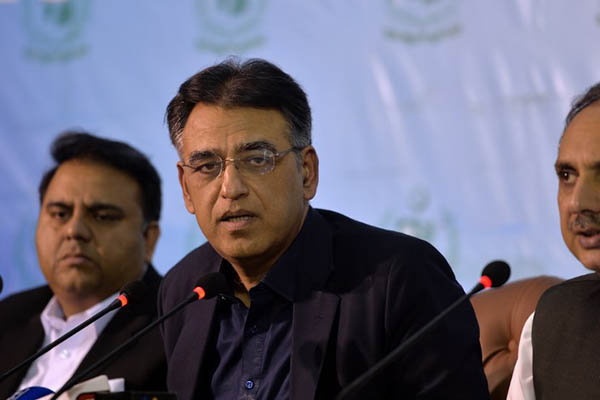
File photo. Aamir Qureshi—AFP
Planning minister rebuts claims that Sindh government is footing lion’s share of Rs. 1.1 trillion plan for metropolis
Planning Minister Asad Umar on Sunday rebutted claims that the provincial government was bearing the bulk of the Rs. 1,100 billion development package announced for Sindh capital Karachi, and urged all stakeholders to avoid “politics” on the issue.
Addressing a press conference at Governor’s House in Karachi alongside Maritime Affairs Minister Ali Haider Zaidi and I.T. and Telecommunication Minister Syed Aminul Haque, he said the funds had been allocated for projects that had been devised years prior but had not been implemented either due to lack of funding or confusion over decision-making.
Umar’s press conference was motivated by a clip of Pakistan Peoples Party Chairman Bilawal Bhutto-Zadari in which he had suggested the Sindh government was spending Rs. 800 billion on Karachi as part of the plan announced by Prime Minister Imran Khan, while the federal government had allocated Rs. 300 billion.
The planning minister told journalists that the federal and provincial governments were united in working together to serve the people of Karachi and there was no difference of opinion on this. However, he admitted that there were some disagreements over who would foot the bill for one or two projects and that had resulted in a debate over who was funding the lion’s share of the development projects.
“It was recognized that both [provincial and federal governments] need each other to meet Karachi’s requirements … It is not a race of who spent more money and who didn’t,” he said and praised Chief Minister Murad Ali Shah for not voicing any disagreement with the plan. “But because the chairman of the party [PPP] has spoken, we felt it necessary to lay some facts down for the record,” he added.
“The total funding for the list of projects shared yesterday, along with the responsibilities assigned, amounted to a 62 percent share of the federal government and 38 percent of the Sindh government,” claimed Umar. He said that even if the Sindh government had spent more, it shouldn’t be an issue as “Karachi brings in 90 percent of the provincial government’s total revenue.” He also stressed that the center wishes to avoid such debates, as there is not point in proving the federal government is “doing more than the Sindh government.”
“They [Karachi development plans] will only be successful if all state organizations, all governments (provincial and federal) facilitate Karachi, which is the largest city, the country’s financial center, industrial center and the biggest revenue-making machine,” he said, adding that if the city were ignored, it would impact Pakistan’s economic future.
Plan break-up
To a question, the federal minister said that the government had envisaged the first phase of the Karachi development plan focusing on cleaning storm water drains, clearing encroachments and resettling displaced populations. He said the current plans called for the Green Line Bus Rapid Transport to be completed in 2021, while the Karachi Circular Railway would complete in 2023.
On Twitter, minister Zaidi claimed that of the Rs. 1.1 trillion project, Rs. 572 billion had been earmarked for the Karachi Circular Railway and linked road works; Rs. 267 billion for solid waste management, clearing of drains and resettlement of displaced persons; Rs. 141 billion for sewage treatment projects; Rs. 92 billion for water supply projects; and Rs. 41 billion for the city’s roads.
PPP Differs
Despite Umar’s claims, Sindh government spokesperson Murtaza Wahab told Geo News that Bhutto-Zardari was right in claiming the major share of the package would be borne by the provincial government. “In the Rs. 1,100 billion package, Rs. 750 billion is the responsibility of the Sindh government and the federal government is taking responsibility of Rs. 362 billion,” he claimed.
